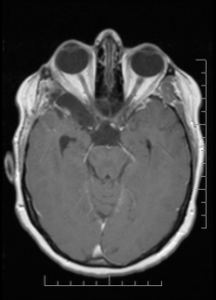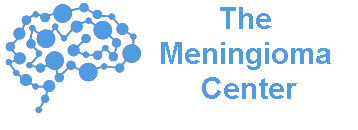DIAPHRAGM SELLAE MENINGIOMA
 Diaphragm Sellae Meningioma
Diaphragm Sellae Meningioma
Diaphragm Sellae Meningioma is a rare and challenging deep tumor located in the central part of the skull base and tucked under the brain. It arises from a meningeal fold called the diaphragm Sellae, which is located over the pituitary gland and behind the optic nerves. As the tumor grows it compresses the optic nerves, the central part of the brain, and engulfs the major arteries supplying blood to the brain.
Symptoms
Diaphragm Sellae Meningioma causes severe unilateral or bilateral visual difficulties. At times visual changes are associated with the pituitary gland and hormonal imbalance or hypothalamic dysfunction with memory loss and drowsiness
Treatment
Treatment of Diaphragm Sellae Meningioma generally requires surgery if the patient presents with vision loss or hormonal dysfunction. Elderly patients with small tumors and minimal symptoms can be treated conservatively with surveillance MRIs. Radiation is generally not recommended because of the proximity to the optic nerves and central parts of the brain.
Surgical Treatment at the Meningioma Center
Option # 1
At the Meningioma Center, we conceptualized the focal orbital approach which can be used for the removal of diaphragm Sellae Meningiomas. This approach associated with the extradural navigation concept allows access to this tumor without hazardous exposure to the brain and only minimal direct manipulation or retraction of it. In selected cases, the focal orbital approach can be done through a small eyebrow incision. The approach allows for early decompression of the optic nerves and early identification for safe control of the carotid arteries and their main branches. Moreover, the approach offers maximal potential for complete resection of the tumor
Option # 2
At the Meningioma Center, an endoscopic transnasal approach is an option for selected cases of small-diaphragm Sellae Meningioma. This approach allows access to the root of the tumor through the nostrils with an endoscopic tool without any manipulation of the brain. This approach requires the participation of our ENT endoscopic nasal surgery specialist.
Prognosis
Adequate surgical Treatment of diaphragm Sellae Meningiomas using the focal orbital approach or the endoscopic nasal approach can allow full or partial recovery of visual difficulties and hypothalamic dysfunction. Moreover, patients have the potential for returning to their lifestyle and job occupation. Patients may need hormonal replacement depending on how much the pituitary gland function had been affected by the tumor. Maximal removal of the tumor and its meningeal root maximizes the chances of cure without tumor recurrence.
